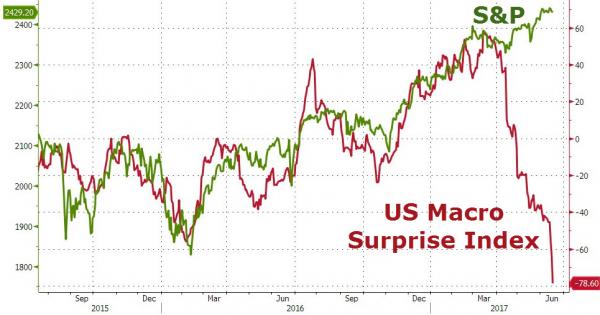The Citi U.S. Macro Economic Index plunged recently. What does it imply for the gold market?
As one can see in the chart below, U.S. economic data has recently disappointed expectations. The U.S. Economic Surprise Index plunged in June to its lowest level since August 2011.
The index measures how actual data readings compare with expectations. A reading above zero means that the data beats expectations on balance, while a negative reading indicates that hard economic data disappointed expectations. We are now at about -80, a collapse of almost 140 points since April. No wonder some analysts are afraid of the upcoming recession or stock-market crash. Indeed, there are some reasons to worry, and some analysts were clearly too optimistic about the so-called Trump trade. If the stock market follows negative economic news, gold should shine.
However, let's look at the chart from a completely different perspective. Since the index is mean reversing (expectations eventually convert to reality), we could see a rebound in the near future. In other words, the index is likely to come back, as it has a natural pull toward zero. Indeed, the Citi U.S. Economic Surprise Index is now at a level where it has tended to pickup over the past couple of years (while the Citi Eurozone Economic Surprise Index is very high right now). The rebound of the index would not be a positive scenario for the yellow metal, as data-beating expectations would strengthen the U.S. dollar, gold’s major antagonist.
To sum up, the Surprise Index fell in June to multi-year low. Although it might seem worrisome — indeed there are many justified reasons for anxiety — investors should not be overly worried about a plunge as it creates the potential for a rebound, which would not be positive for the gold market.

